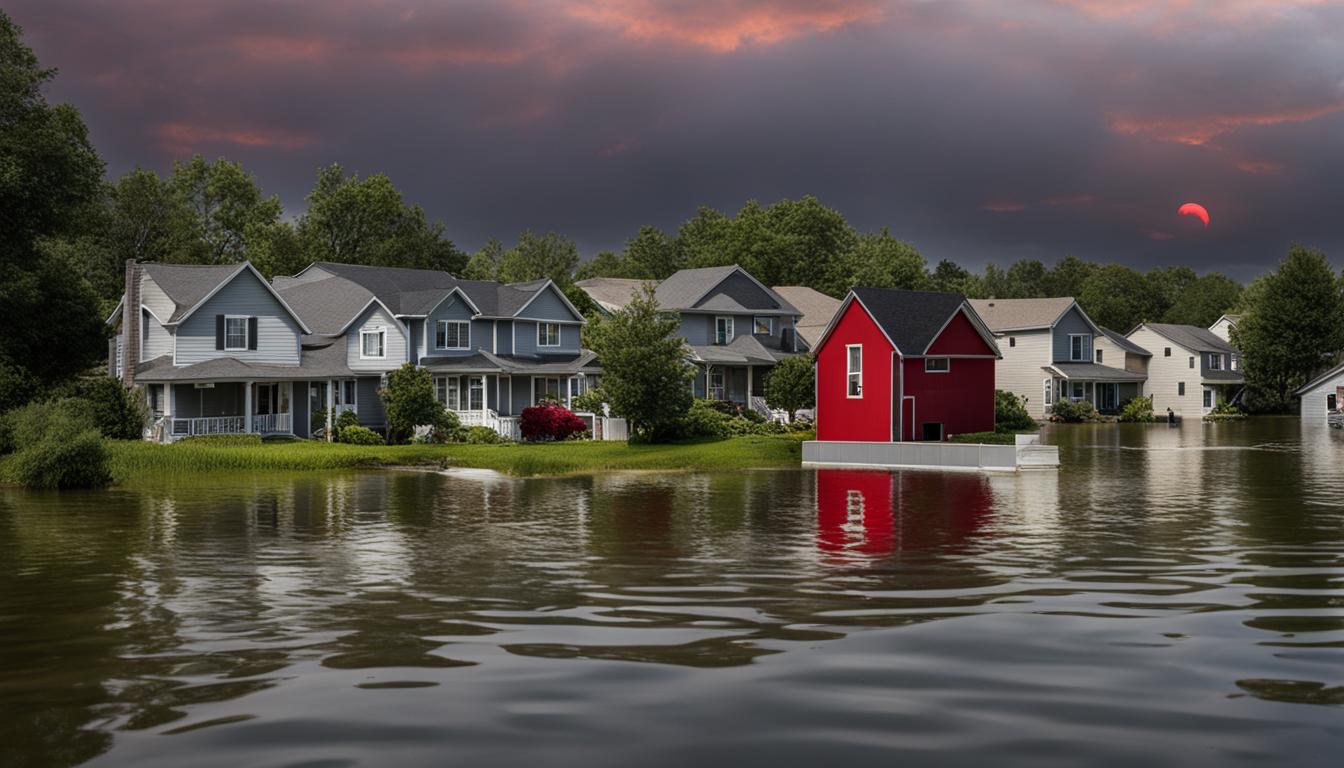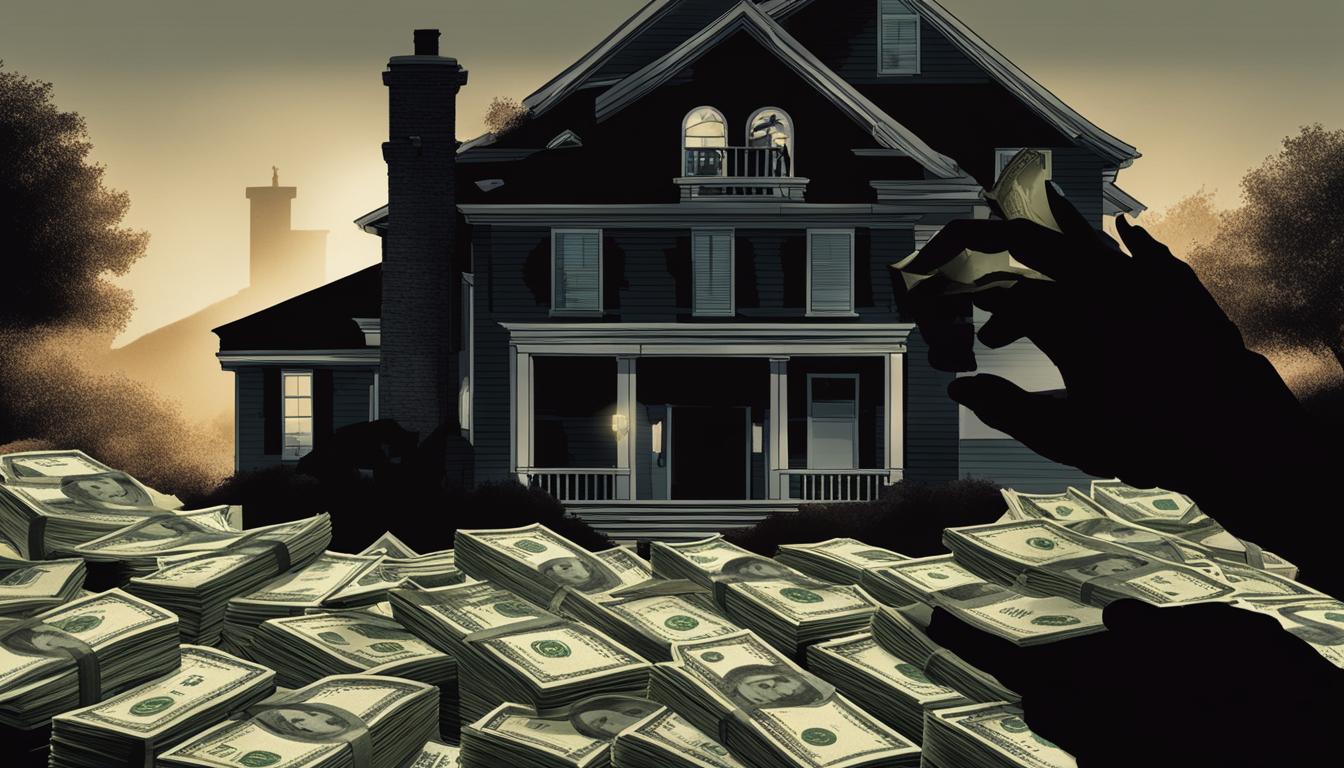As natural disasters become increasingly frequent and severe, homeowners face greater risks and uncertainties. One crucial aspect that homeowners often overlook is their homeowners insurance coverage. With changes in the insurance industry and the potential for insurance companies to go out of business or raise prices, it is more important than ever to review your insurance policy and ensure adequate coverage.
Key Takeaways:
- Regularly review your homeowners insurance coverage.
- Check for policy renewals and ask your insurer to reconsider non-renewal.
- Shop around for the right coverage that matches your property and unique requirements.
- Understand the rising costs of insurance and budget accordingly.
- Consider making home improvements to increase insurance renewal likelihood and potentially lower costs.
The Impact of Dropping Home Insurance Policies
When homeowners receive a notice that their insurance coverage won’t be renewed, it’s important to take immediate action. Contact your insurance agent or company to find out the reason behind the decision. In some cases, the insurer may reverse their initial choice. It’s crucial to understand that if you let your coverage expire, your mortgage lender may require force-placed insurance. These policies are often more expensive and provide limited coverage options.
Under federal law, mortgage servicers must notify homeowners at least 45 days in advance before charging them for force-placed insurance. This gives homeowners a window of opportunity to rectify the situation and find suitable coverage on their own. By staying proactive and addressing insurance company decisions promptly, homeowners can avoid unnecessary cost increases and ensure adequate protection for their property.
“It’s crucial to understand that if you let your coverage expire, your mortgage lender may require force-placed insurance.”
Homeowners should carefully review their policies to understand the potential consequences of dropped home insurance. By being proactive and taking the necessary steps to address coverage gaps, homeowners can protect their financial security and avoid the pitfalls of inadequate protection.
| Table: The Impact of Dropped Home Insurance Policies | |
|---|---|
| Impact | Explanation |
| Increased Costs | Force-placed insurance policies are typically more expensive and provide limited coverage options. |
| Limited Coverage | Homeowners may face gaps in coverage if drop their home insurance policies. |
| Mortgage Lender Requirements | Letting coverage expire may trigger the purchase of force-placed insurance by mortgage lenders. |
Shopping for the Right Coverage
When it comes to homeowners insurance, it is essential to have the right coverage that suits your specific risks and needs. To ensure you are adequately protected, it is crucial to consider various coverage options and understand the resources available to you. Here are some key points to keep in mind:
State Insurance Regulators
Contacting your state’s insurance department is a valuable step in finding the right coverage. State insurance regulators approve insurance companies that operate within the state, ensuring they meet certain standards. By reaching out to your state’s insurance department, you can obtain a list of approved companies that offer policies in your area. This information will help you make an informed decision based on your location and specific insurance requirements.
FAIR Plans
In some cases, homeowners may find it challenging to secure coverage in areas where regular insurance companies do not sell policies. This can be due to increased risks associated with certain locations. However, many states have established Fair Access to Insurance Requirements (FAIR) plans to address this issue. FAIR plans offer coverage options in areas where traditional insurance is not readily available. These plans can be a viable option for homeowners who need coverage but face limited choices. Contact your insurance department to inquire about FAIR plans in your state and explore the coverage they provide.
Notification to Mortgage Servicer
It is crucial to notify your mortgage servicer about any changes in your insurance coverage. Mortgage lenders require property insurance to protect their investment. By informing your mortgage servicer about the change in coverage or the purchase of a new policy, you ensure that your insurance aligns with their requirements. This step helps avoid potential issues and ensures that your coverage remains valid throughout the mortgage period.
Summary
Shopping for the right homeowners insurance coverage involves considering various options and resources. Contacting your state’s insurance department can provide valuable information about approved insurance companies operating in your area. Additionally, exploring FAIR plans can offer coverage solutions in areas where traditional insurance companies are limited. Finally, notifying your mortgage servicer about any changes in coverage is crucial to align with their requirements and ensure continued protection for your home.
The Rising Costs of Insurance
The cost of homeowners’ insurance can be a significant financial burden for many homeowners. Insurance companies often increase premiums, causing budget strains for homeowners. These rising costs can put a strain on homeowners’ budgets, making it important for homeowners to understand the reasons behind these increases and explore ways to mitigate the impact.
Renewal notices are typically sent by insurance companies about a month before the renewal date. It is in these notices that homeowners become aware of the cost for the upcoming year. These notices may come as an unwelcome surprise, especially when the cost increase is significant. Some properties may see an increase of $100 or more per month. With such budget strain, it is important for homeowners to plan ahead and consider their options.
In some cases, homeowners may be able to negotiate with their insurance company for price adjustments or explore other coverage options. Shopping around and comparing quotes from different insurance providers may help homeowners find more affordable options. Additionally, homeowners can consider reviewing their coverage to identify any unnecessary add-ons or coverage amounts that can be adjusted to lower the cost of the premium.
| Insurance Cost Increases | Renewal Notices | Budget Strain | Price Adjustments |
|---|---|---|---|
| Increased premiums | Notified about upcoming renewal costs | Puts strain on homeowners’ budgets | Possibility of negotiating price adjustments |
| Significant financial burden | May come as an unwelcome surprise | Planning ahead is important | Shopping around for more affordable options |
| Reviewing coverage for potential cost reduction |
Protecting Your Home with Improvements
Making home improvements is not only a great way to enhance your living space, but it can also have a positive impact on your homeowners’ insurance. By taking steps to reduce risks and increase the safety and security of your home, you can potentially lower insurance costs and improve the likelihood of insurance renewal.
Reducing Risk
One of the key factors that insurers consider when determining insurance rates is the level of risk associated with a property. By implementing certain improvements, you can reduce the risk of damage and loss, making your home a safer and more desirable property to insure.
For example, installing a fire alarm or security system can significantly reduce the risk of fire or burglary. Strengthening the roof, updating plumbing and electrical systems, and implementing proper drainage systems can minimize the risk of water damage or flooding. These improvements not only protect your home but also make it more resilient against potential disasters.
Lowering Insurance Costs
Insurance companies often offer discounts for homeowners who have taken specific measures to mitigate risks. By making certain home improvements, you may be eligible for lower insurance premiums.
For instance, installing a monitored burglar alarm system or fire sprinklers can make your home less prone to theft or fire damage, resulting in potential discounts on your insurance policy. Consult with your insurance agent to understand the specific improvements that may qualify you for cost-saving benefits.
| Home Improvements | Potential Insurance Benefits |
|---|---|
| Installation of fire alarm and security system | – Discount on insurance premiums – Reduced risk of fire and burglary |
| Strengthening the roof | – Discount on insurance premiums – Minimized risk of wind damage |
| Updating plumbing, electrical, and heating systems | – Discount on insurance premiums – Reduced risk of water damage or electrical issues |
The safety and security of your home are not just important for your own peace of mind but also for your insurance coverage. By making home improvements that reduce risks and enhance security, you can potentially lower insurance costs and increase the likelihood of insurance renewal.
Insurance Coverage Exclusions
When it comes to homeowners and commercial insurance, it’s essential to be aware of the coverage exclusions that may apply. While insurance policies typically cover a wide range of risks, certain disasters like floods, mudslides, and debris flows are often excluded unless they are directly or indirectly caused by a recent wildfire or another covered peril. This means that if you experience damage from these events, it’s crucial to review your policy to understand what is and is not covered.
To address the risk of floods, homeowners should consider purchasing separate flood insurance through the Federal Flood Insurance Program. This coverage is not typically included in standard homeowners’ insurance policies. It’s important to keep in mind that wind and storm damage is usually covered. However, depending on your specific location and risks, you may need additional coverage to adequately protect your property.
Understanding these coverage exclusions and the need for additional coverage is vital in ensuring that you have the right protection for your home. By reviewing your existing homeowners’ policy and assessing your specific risks, you can take the necessary steps to safeguard your property and finances effectively.
| Type of Disaster | Coverage |
|---|---|
| Floods | Typically excluded from standard homeowners’ insurance; requires separate flood insurance through the Federal Flood Insurance Program |
| Mudslides | Generally excluded unless caused by a recent wildfire or another covered peril |
| Debris Flows | Usually excluded unless directly or indirectly caused by a recent wildfire or another covered peril |
| Wind and Storm Damage | Generally covered, but additional coverage may be required for specific risks |
Coverage for Mudslides Caused by Wildfires
Homeowners need to carefully review their insurance policies to ensure they have coverage for mudslides caused by recent wildfires. It is crucial that they are aware of their rights and the responsibilities of their insurance companies in providing this coverage. In a formal notice, the Insurance Commissioner has reminded insurance companies of their duty to cover damages resulting from mudslides related to wildfires.
If homeowners experience mudslide damage and believe it is directly or indirectly caused by a recent wildfire, they should immediately contact their insurance company. In the event of a claim denial, the insurance company is obligated to provide a specific reason for the denial. Homeowners can then seek a review of the denial from the Department of Insurance.
To ensure adequate coverage, homeowners should review their insurance policies and verify that they include provisions for mudslides caused by wildfires. It is important to understand the extent of this coverage and to communicate any concerns or questions to the insurance company or agent. Prompt action and clear communication will help homeowners navigate the claims process and seek the resolution they deserve.
| Key Points: |
|---|
| Homeowners should review their insurance policies for coverage of mudslides caused by recent wildfires. |
| In case of a claim denial, the insurance company must provide a specific reason for the denial. |
| Homeowners can seek a review of the claim denial from the Department of Insurance. |
Auto Insurance and Other Coverage Considerations
When it comes to protecting your home, it’s important to consider not only your homeowners insurance but also your auto insurance and other coverage options. While standard homeowners insurance policies may not cover flood damage, comprehensive auto insurance policies may include coverage for vehicles damaged in floods. This is an important consideration, as flood damage can be costly for both your home and your vehicle.
Another coverage consideration is fallen tree damage. In most cases, homeowners insurance policies will cover damage caused by fallen trees. However, it’s essential to consult with your insurance company to understand the specifics of your coverage. They can provide you with the necessary information about any limitations or requirements related to fallen tree damage.
In addition to these coverage considerations, it’s also vital to review your policy for evacuation benefits. These benefits, such as additional living expense coverage, can help cover the costs associated with mandatory evacuations. It’s crucial to understand what expenses are covered and to keep all receipts and documentation in case you need to file a claim.
Table: Coverage Considerations
| Coverage Options | Key Points |
|---|---|
| Auto Insurance | Comprehensive policies may cover flood damage to vehicles. |
| Fallen Tree Damage | Homeowners insurance generally covers damage caused by fallen trees, but specific limitations may apply. |
| Evacuation Benefits | Review your policy for coverage of additional living expenses during mandatory evacuations. |
By considering these additional coverage options and reviewing your policy thoroughly, you can ensure that you have adequate protection in the event of a natural disaster or other unforeseen circumstances. It’s always a good idea to consult with your insurance agent or company to discuss your specific needs and make any necessary adjustments to your coverage.
Staying Prepared for Disasters
In order to protect your home and belongings during a natural disaster, it is important to be prepared. Taking proactive steps and implementing disaster preparedness measures can help mitigate potential risks and ensure a smoother recovery process. Here are some key strategies to consider:
1. Create a Home Inventory
A home inventory is a detailed record of all your belongings, including their estimated value and purchase dates. This can be crucial for insurance claims in the event of a disaster. Take photos or videos of each room in your home, capturing important details and documenting valuable items separately. Store this inventory in a safe, easily accessible location, such as a cloud storage service, to ensure it remains secure.
2. Store Important Documents Securely
Important documents, such as insurance policies, identification cards, passports, and property deeds, should be stored in a secure and waterproof container. Consider making digital copies of these documents and storing them in a password-protected folder or online cloud storage for easy access. It is also recommended to keep physical copies of these documents in a separate, secure location outside of your home, such as a safe deposit box or with a trusted family member.
3. Create an Emergency Kit
An emergency kit should include essential items that can sustain you and your family for at least three days. This may include non-perishable food, water, a first aid kit, flashlights, batteries, a battery-powered radio, important medications, extra clothing, and personal hygiene items. Keep your emergency kit in a designated location that is easily accessible to all family members.
By taking these proactive measures, you can better protect yourself, your loved ones, and your property during a natural disaster. Stay informed about local emergency plans, evacuation routes, and any specific preparedness recommendations for your area. Be sure to regularly review and update your disaster preparedness strategies to ensure they remain effective.
Seeking Resolution and Assistance
If homeowners have questions or concerns about their insurance coverage, it is important to reach out to their insurance agents for clarification. Agents can provide valuable information and guidance to ensure homeowners have a clear understanding of their policy and coverage. Whether it’s clarifying policy terms, discussing coverage limits, or addressing specific concerns, insurance agents are the primary point of contact for resolving coverage-related issues.
Furthermore, in cases where homeowners encounter difficulties in resolving their insurance-related concerns directly with their agent or insurance company, seeking assistance from the Department of Insurance can be helpful. The Department of Insurance is a regulatory agency that oversees insurance practices and can provide guidance and support to homeowners who are experiencing challenges with their insurance company or agent. They can help mediate and resolve disputes, ensuring homeowners receive fair treatment and appropriate coverage.
When considering the assistance of a public adjuster, homeowners should verify their licensing through the Department of Insurance’s online resources. Public adjusters are professionals who can assist homeowners in the insurance claims process, advocating on their behalf to ensure a fair settlement. However, it is crucial to verify the licensing and credentials of any public adjuster before engaging their services, as this will ensure homeowners are working with a qualified professional who adheres to the regulations and ethical standards set by the Department of Insurance.
When navigating insurance-related issues, it’s important for homeowners to communicate effectively with their insurance agents, seek assistance from the Department of Insurance if needed, and verify the credentials of any public adjuster they may consider working with. By following these steps, homeowners can ensure a smooth resolution to their insurance concerns and receive the support they need to protect their homes and assets.
Conclusion
In conclusion, it is essential for homeowners to regularly review their homeowners insurance coverage to ensure it meets their needs and provides adequate protection. With the increasing risks posed by extreme weather events and natural disasters, staying prepared and informed is crucial. By taking the necessary steps to understand their coverage, shopping around for the right policy, and making home improvements to mitigate risks, homeowners can effectively safeguard their property.
Regular communication with insurance agents and the Department of Insurance is also important to address any questions or concerns that may arise. Whether it’s seeking clarification on policy details or seeking assistance in resolving issues, homeowners should proactively engage with their insurance providers and take advantage of the available resources.
By staying proactive and informed, homeowners can navigate the challenges associated with the rising costs of insurance and the potential impacts of dropping coverage. Remember to regularly review and update your homeowners insurance to ensure that you have the necessary coverage in place to protect your home and belongings.
FAQ
Why is it important to review my homeowners insurance coverage?
Reviewing your homeowners insurance coverage is important because changes in the insurance industry could lead to insurance companies going out of business or raising prices. By staying ahead of high insurance costs and checking for policy renewals, you can ensure that you have the right coverage and avoid any potential risks.
What should I do if I receive a notice that my coverage won’t be renewed?
If you receive a notice stating that your coverage won’t be renewed, you should contact your insurance agent or company to find out why. In some cases, the insurer may reverse their decision. It’s important to understand that mortgage lenders require property insurance, and they may buy force-placed insurance if your coverage expires. Force-placed insurance is generally more expensive and provides limited coverage. Make sure to notify your mortgage servicer about any changes in your coverage.
Does homeowners insurance cover flood damage?
Standard homeowners insurance policies typically do not cover flood damage. Flood insurance is usually purchased separately and is offered through the Federal Flood Insurance Program. If you live in an area prone to flooding, it’s important to consider purchasing flood insurance to ensure you are adequately covered.
What improvements can I make to potentially lower my insurance cost?
Installing a fire alarm or security system can increase the likelihood of insurance renewal and potentially lower the cost. Other improvements like strengthening the roof or updating plumbing, electrical, or heating systems can also reduce the risk of loss, which may result in lower insurance premiums. It’s best to consult with your insurance agent or company to explore available options based on your specific situation.
What should I do if my insurance claim is denied?
If your insurance claim is denied, the insurance company must provide a specific reason for the denial. In such cases, you can seek a review from the Department of Insurance. It’s important to contact your insurance company and understand the claims process thoroughly to ensure you have the necessary documentation and evidence to support your claim.
How can I prepare for potential disasters?
To prepare for potential disasters, it’s recommended to perform a home inventory using a smartphone and store important documents electronically. This will ensure that important information is easily accessible after a disaster. Additionally, it’s important to follow all evacuation orders from local authorities and contact your insurance company to verify coverage provisions and limits.
How can I seek assistance if I have questions or issues with my coverage?
If you have questions or need assistance with your coverage, you should review your policy and contact your insurance agent or company for clarification. If the insurance company or agent fails to respond satisfactorily, you can contact the Department of Insurance for assistance. You can also verify the licensing of any insurance agent or public adjuster offering their services through the Department of Insurance’s online resources.
Source Links
- https://www.consumerfinance.gov/about-us/newsroom/consumer-advisory-take-action-when-home-insurance-is-cancelled-or-costs-surge/
- https://www.insurance.ca.gov/0400-news/0102-alerts/2023/Consumer-Alert-on-Hurricane-Hilary.cfm
- https://www.cbsnews.com/news/home-insurance-use-it-and-you-may-lose-it/






